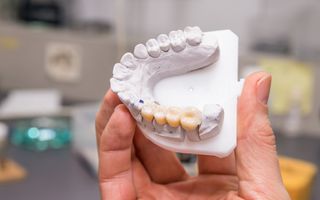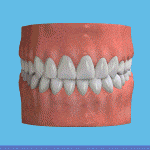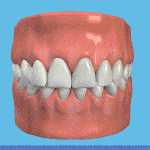
Dental Bridges in Toorak
Bridging the gap with a bright, healthy smile.
Are you missing one or more teeth? Is it affecting your ability to speak, eat, or smile with confidence?
We understand the importance of a healthy and complete smile. Dental bridges are one of the options available for patients with missing teeth, and our friendly team of dental professionals can help you determine if a dental bridge is the right choice for you.
What are dental bridges?
Dental Bridges are a cosmetic dental treatment for the replacement of missing teeth. The treatment focuses not just on the affected tooth but also any damaged teeth adjacent to it, strengthening all of the teeth as a result.
If you are not sure if you need dental bridges, book yourself in for a full dental checkup and your dentist will advise on the best and most effective course of treatment for your needs.

Do you need a dental bridge?
Your dentist might recommend bridges where a tooth, or series of teeth, is missing. Bridges are commonly used
- To improve the appearance and function of your teeth
- To rectify the effectiveness of your bite
- To protect and strengthen damaged teeth
- To close wide gaps between teeth
The difference between bridges and crowns


The reason for getting dental bridges
Your dentist might recommend bridges where a tooth, or series of teeth, is missing. Bridges are commonly used:
Improve the appearance and function of your teeth
Rectify the effectiveness of your bite
Protect and strengthen damaged teeth
Close wide gaps between teeth
Things you should consider when getting a dental bridge
- Traditional bridges sometimes require putting crowns over perfectly healthy teeth: The adjacent teeth that support the bridge will require reshaping and covering, leading to the removal of a portion of their healthy tooth enamel. This heightens the potential for enduring harm to teeth that were initially in good condition. If the adjacent teeth already have fillings, crowns may benefit them.
- Maryland bridges can cause damage to the existing teeth and are not as sturdy: Maryland bridges can cause permanent damage to healthy teeth due to the cementing of metal at the back of the teeth. Additionally, these bridges are less resistant to chewing pressure compared to other types of bridges.
- Bridges don't correct bone loss in the jaw: When a tooth is absent or removed, the jaw bone that previously supported it initiates a process of resorption or dissolution. Unlike implants, which feature an artificial root anchored into the jaw bone, bridges are positioned above the gum line and lack roots. Consequently, bridges do not prevent bone loss like implants do.
- Bridges may not last as long as implants: The success of the bridge depends on the health and strength of the teeth it’s placed on. If decay occurs under the bridge, if there are gum problems, the bridge can fail.
Ready to restore your smile? Regain functionality with a dental bridge and take the first step towards a restored smile. Get in touch with our friendly team to schedule an appointment.
Frequently asked questions
With good care and regular check-ups, a dental bridge can last for at least 10 years. You will need to avoid biting down on very hard and very sticky foods to minimise the chance of breaking the bridge or even pulling it off.
You will also need to maintain good dental hygiene to support the strength of your natural teeth and gums, as these support the bridge.
This cost varies depending on the type of bridge you get, the materials involved, and other factors. Your dentist will be able to give you a better estimate once they have a better idea of your situation and oral health.
Keep in mind, that your insurance may pay for some of the treatment, so it’s worth checking with your provider.
Usually, a bridge replaces just one tooth, but it can replace up to four teeth. It can depend on your oral health and the placement of the gap, so be sure to ask your dentist for the best options.
Dental bridges are quite safe with few side effects, but there are some possibilities to be aware of. These include swelling and pain around the site following each procedure, infection, potential nerve damage, and breakages or slips of the bridge itself.
If you experience any side effects following your dental bridge treatment, don’t hesitate to contact your dentist.
Book your appointment at K1 Dental Toorak
We can book your first checkup appointment or a free cosmetic consultation.



